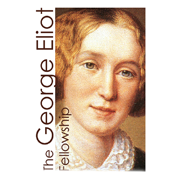George Eliot Review online
 The George Eliot Fellowship was aware of the value to scholars and readers of our backlog of serious academic research within the 40 years of the 'George Eliot Fellowship Review' and 'George Eliot Review'. Following a visit to the UK in 2015 Dr. Beverley Rilett volunteered to digitise, host and maintain the online journal to enable free global access for future researchers.
The George Eliot Fellowship was aware of the value to scholars and readers of our backlog of serious academic research within the 40 years of the 'George Eliot Fellowship Review' and 'George Eliot Review'. Following a visit to the UK in 2015 Dr. Beverley Rilett volunteered to digitise, host and maintain the online journal to enable free global access for future researchers.
In 2017 Dr. Rilett and her team at the University of Nebraska-Lincoln began the task of digitizing and publishing online each issue of the George Eliot Fellowship Review and the George Eliot Review. Every edition of the journal can be accessed at George Eliot Review and users are able to search the contents by year, issue number, author, genre and subject.
In 2021 Dr Rilett took up a post as Associate Research Professor, Special Collections & Archives at Auburn University, Alabama where she continues to maintain the site along with two other sites George Eliot Archive and George Eliot Scholars
George Eliot in the Digital Age: Innovative Tools for Scholars and Enthusiasts by Dr Rilett
'We're thrilled to share the latest developments at the George Eliot Archive, where cutting-edge technology meets our shared passion for Eliot's literary legacy. As devoted Eliot scholars and enthusiasts, you're already familiar with our digital archive which launched January 2019, the bicentenary of Eliot’s birth. However, we're confident that our recent innovations will reignite your excitement and open new avenues for research and appreciation of George Eliot’s life and works.
At the forefront of our recent advancements is the George Eliot Text Explorer, a sophisticated concordance tool that has been a major work in progress for nearly two years by lead developers Libo Sun and Yue Cui. This powerful resource allows users to delve deeper into Eliot's writings than ever before. What began as a simple word search function has evolved into a nuanced tool capable of exploring various word endings, multiple-word phrases, and soon, even semantic search results. This will enable you to find not just exact matches for your queries, but conceptually related content as well. Imagine being able to trace the evolution of Eliot's ideas across her entire body of work with just a few clicks!
We've also harnessed the power of artificial intelligence to enhance our archive in ways that George Eliot herself might have found fascinating. Using large language models like GPT-4, we've generated chapter summaries, character lists, real and fictional settings, and even identified key quotations from Eliot's novels. We are also generating “alt-text” descriptions for our image galleries and collections to improve accessibility for visually impaired users. While we maintain rigorous human oversight to ensure accuracy, these AI-assisted features offer new perspectives and starting points for your own explorations and analyses.
For those of you who enjoy visual representations of textual data, we've integrated Voyant Tools into our platform. This open-source text analysis software provides a variety of ways to visualize the patterns and trends in Eliot's writing. From word clouds to frequency graphs, these tools can reveal insights that might not be immediately apparent through traditional close reading methods.
The foundation of our text analysis tools rests on the meticulous work of our editorial team; currently led by Drs. Beverley Park Rilett and Yue Cui, with English graduate students Sarah Guyer, Alexis Stoffers, and Kaylen Michaelis. These dedicated scholars have been tirelessly digitizing, cleaning optical character recognition (OCR) transcriptions, proofreading, and marking up Eliot's complete works. Their efforts have resulted in TEI-encoded versions of all Eliot's fiction, poetry, and nonfiction essays, creating a rich, searchable, and machine-readable database. This painstaking editorial work provides the essential foundation for our Text Explorer and other AI-enhanced analytical tools. The dataset the editorial team has created is also facilitating new research into Eliot’s authorial fingerprint through stylometric analysis by our computer science researchers. Our collaborative team of editors and programmers are discovering new ways to capture the nuances of Eliot's writing and enabling unprecedented exploration of her entire oeuvre.
The George Eliot Archive provides a comprehensive and accurate digital resource for George Eliot studies with pre-1929 publications on Eliot and original, born-digital search and visualization tools. However, that is not the only website we host. We also provide the entire digital backlist of the Fellowship’s George Eliot Review on our searchable site, GeorgeEliotReview.org. On a third “sister site,”, you can find recent scholarship including open-access critical essays, presentations, dissertations, and other shared Eliot-related resources on the GeorgeEliotScholars.org digital commons. The Archive, Review Online, and Scholars digital humanities projects are all sponsored by Auburn University and free for everyone to use.
As members of the George Eliot Fellowship, you understand better than most the enduring relevance of George Eliot's work. We believe these new digital tools and resources will not only enhance your own engagement with her writings but also help to introduce new generations to the depth and complexity of her literary achievements.
We warmly invite you to visit or revisit the George Eliot Archive and explore these new features for yourself. Your feedback and insights as dedicated Eliot scholars and enthusiasts are invaluable to us as we continue to develop and refine these tools. We’d love to hear from you at GeorgeEliotArchive@gmail.com or BDR0032@Auburn.edu. Together, we can ensure that George Eliot's legacy continues to thrive in the digital age, making her works more accessible and engaging than ever before.'

